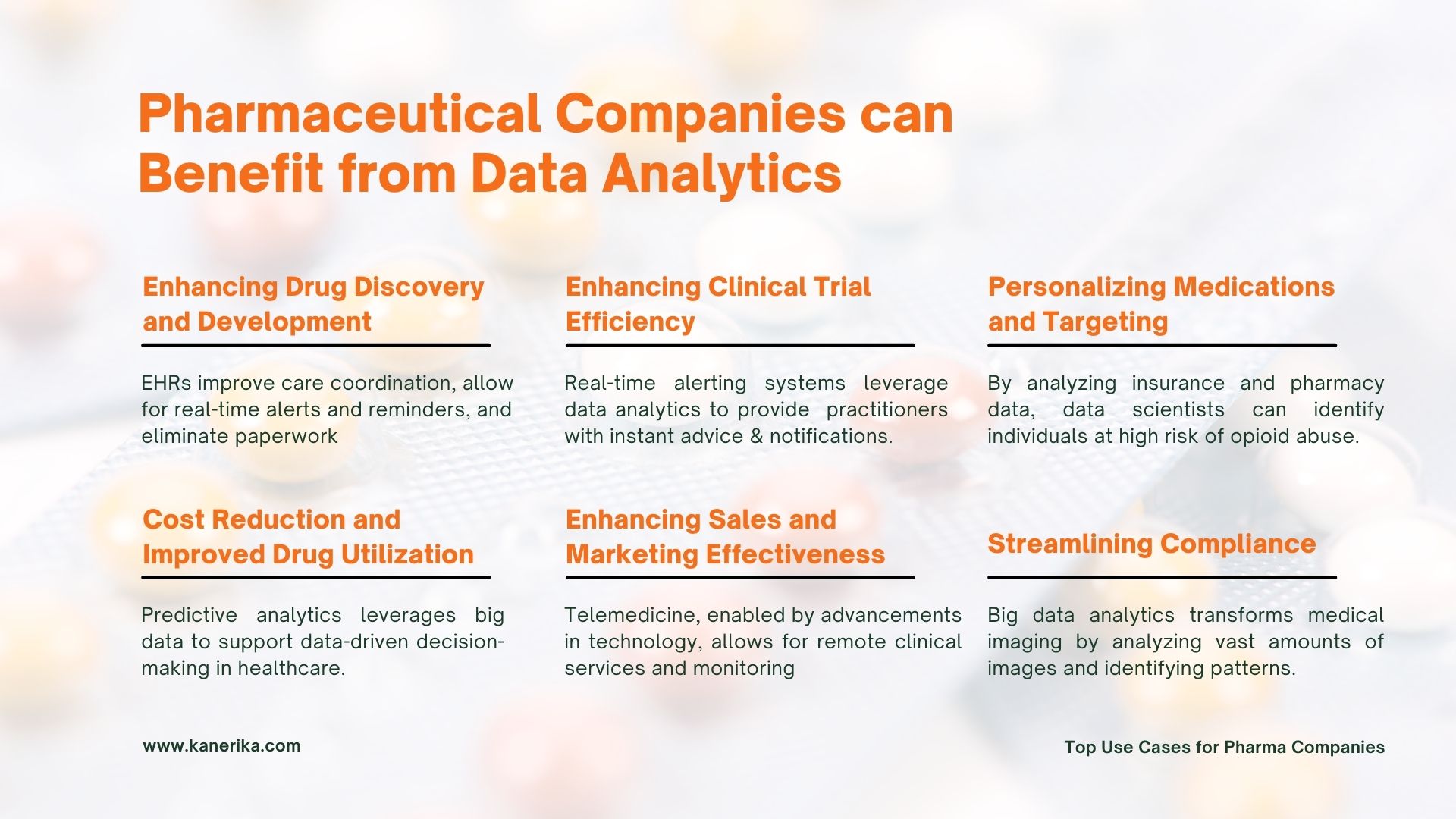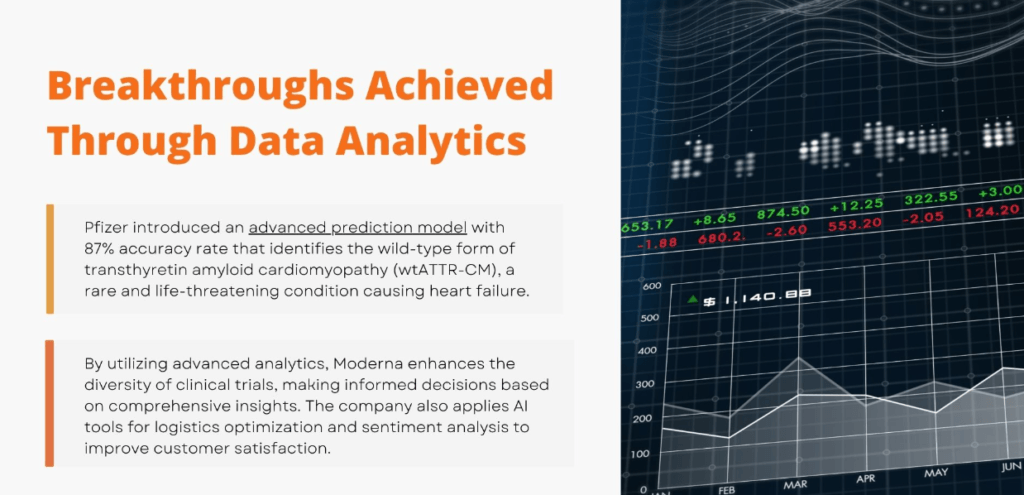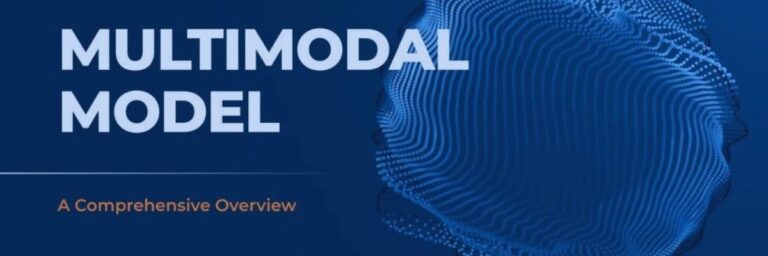200,000 people are born every day. That’s right. Two hundred thousand. With each birth, the weight of responsibility falls squarely upon the shoulders of the pharmaceutical industry to ensure the well-being and happiness of each and every individual.
Brace yourself for a revelation: by 2027, the pharmaceuticals market volume is predicted to reach an extraordinary US$1,435.00 billion. It’s a testament to our unwavering commitment to improving healthcare worldwide.
But, how do we path the way for a healthier tomorrow? What measures is the industry taking?
The realm of advanced analytics holds tremendous potential for pharmaceutical companies. As per McKinsey’s analysis, the broader integration of data-driven technologies can significantly enhance business operating performance. Over five years, it is projected that adopting these technologies could lead to a remarkable increase of 15 to 30 percent in EBIDTA (Earnings Before Interest, Taxes, Depreciation, and Amortization). Looking ahead to a decade, the expected improvement ranges between 45 to 75 percent, indicating a substantial transformation on the horizon.
Let’s decode how exactly data analytics for pharms development is revolutionizing the pharmaceutical sector!
How does Data Analytics Ensure Success for Pharmaceutical Companies?
To maximize benefits, a comprehensive organizational strategy is crucial. Data analytics for pharma development offers significant advantages for gathering data and generating impactful insights at scale.
However, companies need to prioritize their investments wisely. There is untapped potential for pharma businesses to embrace data-driven strategies across all functions. Overcoming data and process silos is vital for business intelligence and big data analytics in the industry.
Successful implementation requires agile use-case sprints, streamlined governance, and effective change management. Leadership-driven action helps dispel biases and skepticism while starting with targeted use cases and demonstrating early ROI builds momentum and garners support for the analytics initiative.
Let’s understand the use cases in more detail.
Transform Drug Development with Advanced Analytics – Start Now
Partner with Kanerika for Advanced Data Analytics Services
Top Use Cases for Data Analytics in Pharma

1. Enhancing Drug Discovery and Development
The rising cost of introducing new drugs and the expiration of blockbuster drug patents have prompted the pharmaceutical industry to seek ways to expedite drug development. Leveraging pharma data analytics can accelerate drug discovery by analyzing scientific publications, research papers, and control group data.
By employing predictive algorithms, pharmaceutical firms can make informed decisions, optimize operations, enhance safety protocols, and improve drug trials, leading to better financial performance and increased innovation in drug discovery.
2. Enhancing Clinical Trial Efficiency
Utilizing big data analytics in the pharmaceutical field can help reduce costs and expedite clinical trials. By analyzing various data points such as participants’ demographics, historical data, remote patient monitoring data, and past clinical trial events, pharmaceutical businesses can optimize the entire process.
Through the identification of test sites with high patient availability and the application of pharmaceutical analytics, disease diagnosis can be accelerated. Additionally, control groups and clinical trials can be designed more efficiently, and the overall efficacy of clinical trials can be increased.
3. Personalizing Medications and Targeting
Big data analytics in the pharmaceutical industry can address the challenge of personalizing medications for individuals based on their unique genomic makeup.
By analyzing genomic sequencing data, patient medical sensor data, and electronic medical records, pharmaceutical companies can identify patterns and create more effective and personalized medications.
4. Cost Reduction and Improved Drug Utilization
To enhance pharmacy operating margins in the face of increasing pressures, pharmaceutical businesses can employ granular analysis of key metrics. These include average ingredient cost per prescription and rebate percentage of total drug spending, etc.
5. Capturing Relevant Data through Social and Search Engine Listening
Pharmaceutical companies can gather valuable information by monitoring online conversations about product launches and competitor activities. Social and search engine listening powered by data analytics for pharma development enables companies to gauge public perception and address safety-related concerns promptly.
6. Enhancing Sales and Marketing Effectiveness
Pharma business intelligence facilitates the identification of new markets. Simultaneously, enabling analysis of marketing channel efficiency, empowering companies to prioritize efforts and gain a competitive edge.
By analyzing patient trends and leveraging innovative technologies and big data analytics, pharmaceutical businesses can optimize sales and marketing strategies, leading to increased effectiveness and improved decision-making.
7. Streamlining Compliance
With the complexity and increasing stringency of government regulations, non-compliance can lead to reputational damage and significant financial liabilities. Big data analytics in the pharmaceutical industry aids in uncovering insights, streamlining governance decisions, and highlighting gaps in drug safety. Digital operations assistance can also support human workers in daily tasks and mitigate the risk of compliance failures.
8. Enhancing Operations and Employee Training
Pharmaceutical companies can achieve cost reductions and process improvements by leveraging pharmaceutical analytics and data insights. Advanced analytics can provide valuable information on how machine settings, operator training levels, or raw material inputs impact output quality.
Meanwhile, predictive analytics and big data analytics enable the prediction of risks such as quality issues. Alongside machine failures, or changes in demand, enabling analytics leads to proactive decision-making and process optimization.
Improving Financial Efficiency with Advanced Data Analytics Solutions
Boost your financial efficiency—unlock insights and drive smarter decisions with advanced data analytics solutions!
Top Data Analytics tools and technology in Pharmaceutical Industries
1. Power BI
Power BI is one of the leading business intelligence tools that help pharmaceutical companies analyze and visualize data. Its interactive dashboards and real-time data visualization make it easy for decision-makers to understand complex data sets and act on them.
Key Benefits:
- Real-time insights into drug trials and production
- Visualize sales performance and market trends
- Improved collaboration across departments
2. Tableau
Tableau is another powerful data visualization tool commonly used in pharmaceutical data analytics. It allows users to create sophisticated visualizations with minimal coding.
Key Benefits:
- Highly interactive reports and dashboards
- Easy integration with various data sources
- Provides actionable insights across clinical trials and sales data
3. SAS
SAS is a comprehensive data analytics platform used widely in the pharmaceutical industry for clinical trials, forecasting, and predictive analytics. It provides advanced analytics solutions with a strong focus on data quality and compliance with regulations.
Key Benefits:
- Supports clinical trial data analysis
- Advanced statistical modeling capabilities
- Strong regulatory compliance features
4. QlikView
QlikView is a data analytics tool designed for fast data integration, analysis, and reporting. It is commonly used in pharmaceutical companies for marketing analytics, sales reporting, and inventory management.
Key Benefits:
- Provides in-depth analysis of marketing and sales data
- Optimizes inventory management and supply chain operations
- Easy-to-use interface for non-technical users
5. Alteryx
Alteryx is a data analytics platform specializing in data preparation and automation. In the pharmaceutical industry, it’s used for data blending, predictive modeling, and operational reporting.
Key Benefits:
- Automates data preparation and cleaning
- Integrates multiple data sources for comprehensive analysis
- Predictive analytics for market trends and sales forecasts
6. IBM Watson Health
IBM Watson Health offers AI-driven data analytics to help pharmaceutical companies make smarter decisions. Watson can analyze massive datasets, from clinical trials to market research, to provide actionable insights.
Key Benefits:
- AI-powered data insights for faster decision-making
- Streamlines clinical trials and research processes
- Reduces costs associated with drug development
Accelerate Clinical Trials Through Data Insights – Learn How
Partner with Kanerika for Advanced Data Analytics Services
How Pharma Companies Harness Data Analytics for Breakthroughs

1. Early Detection of Rare Diseases: Pfizer’s Breakthrough
Pfizer introduced an advanced prediction model that identifies the wild-type form of transthyretin amyloid cardiomyopathy (wtATTR-CM), a rare and life-threatening condition causing heart failure. With an 87 percent accuracy rate, this model utilizes electronic health records and medical claims to diagnose patients. Thus, leading to a timely treatment and improved outcomes for individuals with ATTR-CM.
2. Enhanced Diversity in Clinical Trials: Moderna’s Data Analytics
Moderna leverages Google Cloud’s Looker platform to access reliable and secure metrics, enabling in-depth analysis of clinical trial data and integration with external medical datasets. By utilizing advanced analytics, Moderna enhances the diversity of clinical trials, making informed decisions based on comprehensive insights. The company also applies AI tools for logistics optimization and sentiment analysis to improve customer satisfaction.
3. Revolutionizing Cardiovascular Trials: AstraZeneca’s AI Initiative
AstraZeneca pioneers AI-driven clinical trials, particularly in cardiovascular studies, through the AIDA project. This initiative encompasses event detection, harmonization, and classification components. Leveraging home monitoring, geofencing, and patient self-reporting, AstraZeneca expedites event detection. The integration of structured and unstructured data with deep learning algorithms automates data processing. Meanwhile ,machine learning facilitates event identification and classification, potentially reducing the time for new treatments to reach patients.
Why AI and Data Analytics Are Critical to Staying Competitive: Key Stats and Insights
Discover how AI and data analytics drive competitiveness—explore key stats and insights to stay ahead!
Data Analytics: Shaping the Future of Pharmaceutical Innovation with Kanerika
The pharmaceutical industry is harnessing the power of data analytics for pharma development. Companies are using AI to revolutionize various aspects of drug discovery, clinical trials, personalized medicine, and pandemic response.
Kanerika is a platform leading pharma companies can rely on. When Dr. Reddy’s faced the challenge of slow response times and data fragmentation across applications and departments, Kanerika collaborated with them to design and deploy a unified data architecture, including a data lake and a new Hadoop stack.
We standardized reporting methods, cleansed existing data, and enabled user self-service with new dashboards and reports, which resulted in a 20x reduction in time to an answer, enabling faster decision-making. Sounds like the right fit for you?
Book a Meeting Today to Level Up your Business!
Optimize Your Pharma Supply Chain – Explore Analytics Solutions
Partner with Kanerika for Advanced Data Analytics Services
FAQ
How is data analytics used in the pharma industry?
Pharma uses data analytics to drastically improve drug discovery, speeding up the process and reducing costs. It helps analyze clinical trial results for better efficacy and safety assessments, leading to faster approvals. Furthermore, it optimizes supply chains, personalizes patient treatment, and predicts market trends for improved profitability. Essentially, data analytics helps make the entire pharmaceutical lifecycle more efficient and effective.
What are the 4 types of data analytics?
Data analytics tackles problems using different approaches. Descriptive analytics summarizes past data; diagnostic digs into *why* things happened. Predictive uses past data to forecast the future, while prescriptive offers recommendations based on predictions and optimization strategies. Essentially, they represent a progression from understanding the past to influencing the future.
What does a pharmacy data analyst do?
Pharmacy data analysts are detectives of drug trends. They sift through mountains of prescription, sales, and patient data to identify patterns, predict future needs, and improve pharmacy operations. This might involve spotting medication overuse, optimizing inventory, or even informing public health initiatives. Ultimately, they use data to make pharmacies more efficient and patient care more effective.
What is the future of analytics in pharma?
Pharmaceutical analytics is rapidly evolving beyond simple data crunching. We’ll see AI and machine learning drive more personalized medicine, predicting treatment responses and accelerating drug discovery. Real-world data and its ethical handling will become increasingly crucial for improving patient outcomes and regulatory compliance. Ultimately, the future hinges on leveraging data to create more effective, accessible, and affordable healthcare.
What is the salary of data analyst in pharmaceutical industry?
A data analyst’s pharmaceutical industry salary varies widely based on experience, location, company size, and specific skills. Generally, expect a competitive salary reflecting the industry’s high demand for data-driven insights. Entry-level positions might start lower, while senior analysts with specialized skills in biostatistics or regulatory affairs command significantly higher pay. Researching specific job postings provides the most accurate salary range for your situation.
How Coca Cola is using data analytics?
Coca-Cola leverages data analytics to deeply understand consumer preferences, tailoring marketing campaigns and product development for specific demographics and regions. They use data to optimize supply chains, predicting demand and minimizing waste. This data-driven approach also helps them personalize customer experiences and improve their overall brand strategy. Ultimately, it’s about maximizing efficiency and relevance in a competitive market.
Why is data analysis important in pharmacy?
Data analysis in pharmacy is crucial for optimizing patient care and business operations. It helps identify trends in medication usage, pinpoint potential drug interactions or adverse effects, and improve treatment efficacy. Ultimately, this leads to better health outcomes and more efficient pharmacy management. This informed decision-making minimizes errors and improves patient safety.
How do pharmaceutical companies collect data?
Pharmaceutical companies gather data through a multi-pronged approach. This includes massive clinical trials involving patient records and outcomes, real-world evidence from electronic health records and post-market surveillance, and extensive laboratory research and pre-clinical studies. Analyzing this diverse data helps them understand drug efficacy, safety, and market potential. Ultimately, the goal is to improve health outcomes while meeting regulatory requirements.
What is the role of analysis in pharmaceutical industry?
Analysis in pharmaceuticals isn’t just testing; it’s the bedrock of safety and efficacy. It ensures drug quality throughout the entire lifecycle, from raw materials to final product, guaranteeing consistency and purity. This rigorous analysis also drives research and development, informing improvements and new drug discoveries. Ultimately, it protects patients.
What is data integrity in pharma?
Data integrity in pharma means ensuring all drug development and manufacturing data is accurate, complete, consistent, and trustworthy throughout its lifecycle. This is crucial for patient safety and regulatory compliance, preventing flawed or fraudulent data from impacting product quality or approvals. A breach jeopardizes patient health and company reputation, leading to severe consequences. It’s about having confidence in the data underpinning every aspect of a pharmaceutical product.
What is the role of data analytics in healthcare industry?
Data analytics in healthcare transforms raw medical data into actionable insights. It helps improve patient care by predicting risks, personalizing treatments, and optimizing resource allocation. Essentially, it allows for more efficient, effective, and cost-conscious healthcare delivery. This leads to better outcomes and improved overall system performance.
What is the course of pharma analytics?
Pharmaceutical analytics is a data-driven field blending chemistry, statistics, and informatics. It focuses on extracting meaningful insights from drug development data – from initial discovery to post-market surveillance. This helps optimize processes, predict outcomes, and ensure drug safety and efficacy throughout the entire lifecycle. Essentially, it’s using advanced analytics to make smarter decisions in the pharmaceutical industry.
How is big data used in pharmaceutical industry?
Big data revolutionizes pharmaceutical research by accelerating drug discovery through analyzing massive datasets of genomic information, clinical trials, and patient records. This helps identify potential drug targets, predict drug efficacy, and personalize treatments. It also optimizes clinical trials, streamlines supply chains, and enhances regulatory compliance. Essentially, it speeds up the entire drug development lifecycle and improves patient outcomes.
How data analytics works?
Data analytics transforms raw data into actionable insights. It uses various techniques – from simple summaries to complex machine learning – to uncover patterns, trends, and anomalies. This allows businesses and individuals to make better decisions, optimize processes, and improve outcomes. Essentially, it’s about asking smart questions of data and getting meaningful answers.
How does analytics collect data?
Analytics gathers data from various sources, like website activity, customer databases, and sensor readings. It uses tools and techniques to automatically extract this information, often in real-time, and then organizes it for analysis. This data collection is driven by specific questions or goals, ensuring only relevant information is captured. Think of it as a sophisticated, automated information gathering system.
What is the difference between Llama 2 and llama 3 tokenizer?
In pharma development, Llama 2 and Llama 3 tokenizers differ in their ability to process complex data sets. Llama 3 offers improved tokenization for pharmaceutical text analysis, enabling more accurate insights in drug discovery and clinical trial data. This enhances data-driven decision making, streamlining the development process and reducing costs.
Can llama 3.1 do image analysis?
Llama 3.1 can perform image analysis in pharmaceutical development, such as detecting abnormalities in medical images, which aids in disease diagnosis and drug discovery, ultimately streamlining clinical trials and improving patient outcomes through data-driven insights.
Is llama 3 autoregressive?
Llama 3 is not autoregressive in the classical sense, as it uses a combination of masked language modeling and reinforcement learning from human feedback to generate text, offering pharmaceutical developers more accurate predictive analytics and insights in drug discovery and clinical trial optimization.
What is llama 3 AI used for?
Llama 3 AI is used in pharmaceutical development for predictive modeling and data analysis, enhancing clinical trial design and patient outcomes. It helps researchers identify patterns and trends in large datasets, streamlining the drug discovery process and reducing development costs. By leveraging machine learning algorithms, pharma companies can make informed decisions and accelerate time-to-market for new treatments. This enables more efficient and effective drug development, ultimately improving patient care and business results.
Is Llama 3 a transformer model?
Llama 3 is indeed a transformer model, leveraging artificial intelligence and machine learning to analyze complex data in pharmaceutical development, driving informed decision-making and streamlining clinical trials, ultimately enhancing drug discovery and development processes.
How does llama 2 compare to GPT-4?
Llama 2 and GPT-4 are AI models used in pharmaceutical data analysis for predictive modeling and clinical trial optimization. Llama 2 is more focused on natural language processing, while GPT-4 excels in handling complex data sets, making it a better choice for pharma development analytics and drug discovery research. This difference impacts the accuracy of patient outcomes and treatment efficacy predictions, ultimately influencing business decisions in the pharmaceutical industry.
Can Llama 3 do OCR?
In pharmaceutical development, Llama 3’s capabilities include text analysis, but its OCR functionality is limited. For optical character recognition tasks, such as extracting data from scanned documents or handwritten notes, specialized OCR tools are more effective, streamlining data analytics and clinical trial management processes.
Is Llama 3 pretrained?
Llama 3 is indeed pretrained, leveraging large datasets to enhance its performance in pharmaceutical development analytics, such as clinical trial optimization and drug discovery insights, ultimately driving informed decision-making in the pharma industry.
How many tokens does Llama 2 have?
Llama 2 has 1.5 trillion parameters and 65,000 tokens, enabling advanced data analysis in pharmaceutical development, such as predictive modeling and clinical trial optimization, to inform business decisions and drive innovation in the industry.
How does Llama 3 compare to GPT-4?
Llama 3 and GPT-4 are AI models used in pharmaceutical data analysis for drug development and clinical trials. Llama 3 has a larger knowledge base, while GPT-4 excels in natural language understanding, benefiting pharma companies in patient data analysis and personalized medicine research, ultimately enhancing healthcare outcomes and medical research efficiency.
Which tokenizer does Llama 3 use?
Llama 3 utilizes a custom tokenizer designed to efficiently process and analyze large datasets, similar to those found in pharmaceutical development and data analytics. This tokenizer enables effective text processing, facilitating insights that can inform pharmaceutical research and development, clinical trials, and regulatory submissions, ultimately driving business growth and improving patient outcomes.
Which is better, llama or alpaca wool?
In pharma development, the choice between llama and alpaca wool is irrelevant. Instead, focus on data-driven insights from pharmaceutical analytics and business intelligence to inform development decisions, driving innovation and patient outcomes in the healthcare industry.
How many languages does Llama 3 support?
Llama 3 supports over 100 languages, facilitating multilingual data analysis in pharmaceutical development, enabling researchers to process and understand diverse clinical trial data, and streamline regulatory compliance across global markets.
Is Llama 3 a decoder only model?
Llama 3 is indeed a decoder-only model, which has significant implications for pharmaceutical development and data analytics. This architecture enables efficient processing of large datasets, facilitating trend analysis and insights in pharma development, particularly in areas like clinical trial optimization and patient outcomes research.
Which is more friendly, alpaca or llama?
This question is unrelated to data analytics in pharma development. However, in a general context, both alpacas and llamas are considered friendly animals, often used in animal-assisted therapy and educational programs, offering unique benefits in terms of stress relief and social interaction, which can be valuable in various professional settings, including pharmaceutical research environments.









